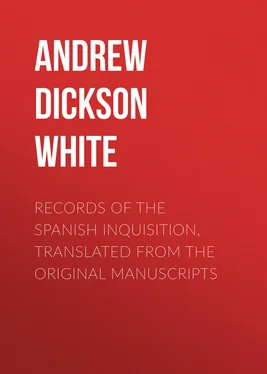Andrew Dickson White - Records of the Spanish Inquisition, Translated from the Original Manuscripts
Здесь есть возможность читать онлайн «Andrew Dickson White - Records of the Spanish Inquisition, Translated from the Original Manuscripts» — ознакомительный отрывок электронной книги совершенно бесплатно, а после прочтения отрывка купить полную версию. В некоторых случаях можно слушать аудио, скачать через торрент в формате fb2 и присутствует краткое содержание. Жанр: foreign_prose, foreign_religion, Философия, foreign_psychology, foreign_antique, на английском языке. Описание произведения, (предисловие) а так же отзывы посетителей доступны на портале библиотеки ЛибКат.
- Название:Records of the Spanish Inquisition, Translated from the Original Manuscripts
- Автор:
- Жанр:
- Год:неизвестен
- ISBN:нет данных
- Рейтинг книги:3 / 5. Голосов: 1
-
Избранное:Добавить в избранное
- Отзывы:
-
Ваша оценка:
- 60
- 1
- 2
- 3
- 4
- 5
Records of the Spanish Inquisition, Translated from the Original Manuscripts: краткое содержание, описание и аннотация
Предлагаем к чтению аннотацию, описание, краткое содержание или предисловие (зависит от того, что написал сам автор книги «Records of the Spanish Inquisition, Translated from the Original Manuscripts»). Если вы не нашли необходимую информацию о книге — напишите в комментариях, мы постараемся отыскать её.
Records of the Spanish Inquisition, Translated from the Original Manuscripts — читать онлайн ознакомительный отрывок
Ниже представлен текст книги, разбитый по страницам. Система сохранения места последней прочитанной страницы, позволяет с удобством читать онлайн бесплатно книгу «Records of the Spanish Inquisition, Translated from the Original Manuscripts», без необходимости каждый раз заново искать на чём Вы остановились. Поставьте закладку, и сможете в любой момент перейти на страницу, на которой закончили чтение.
Интервал:
Закладка:
Answered, that they were all old Christians of pure blood, and that he had never heard or understood that any one of them had been imprisoned, put under penance, absolved, or condemned by the Holy Office of the Inquisition; that he had never been imprisoned by the Holy Office till the present occasion.
Questioned, if he was a baptized and confirmed Christian, and made it a practice to attend mass, go to confession, and communicate, at the times fixed by the Holy Mother Church.
Answered, that he was a Christian, and was baptized, according as he had heard from his parents, in the cathedral church of Manresa, but did not know the name of the bishop who confirmed him; that he made it a practice to hear mass, confess, and commune, at the times prescribed by the holy Mother Church, and that his last confession was in the town of Valles Campo de Tarragona, in the month of October last, on the day of Our Lady del Rosario of the fleet of Don John of Austria, which confession was made to a Carmelite friar, of the convent of that city, whose name he did not know; that he received the holy sacrament from the hands of the same Friar; that he had also confessed and received the sacrament during the Lent of the last year, in the church of Igualada, before a priest belonging there, whose name he did not know; and that he had a certificate to this effect in his possession, when he was taken to prison.
Here he crossed himself, repeated the Paternoster, Ave Maria, and Credo in Latin, the Salve Regina, the ten commandments, the seven deadly sins, and the general confession in Catalan, all correctly, and declared he knew nothing more of the christian doctrine.
Questioned, if he could write or read, or had ever studied any science or faculty.
Answered, that he could read, but badly, having taught himself. That he had never studied any art, and could not write.
Questioned, if he had ever been out of the kingdom of Arragon, and with what persons.
Answered, that he had once visited the kingdom of Granada, but not in company with any person; and that he had never had communication with people of suspicious faith.
Questioned, what were the events of his life.
Answered, that he was born in the city of Manresa, as aforesaid, and brought up in the house of his father, till the age of sixteen years, when he was sent to the town of Igualada, to Maestre Ando, a blacksmith and farrier, with whom he staid four months, learning his trade; that he afterwards resided in several places in Catalonia, and then visited Arragon and Granada, as above stated, made no long stay, but returned hither about two years ago; that lately he had been dwelling in the village of Pont de Armenteria, Campo de Tarragona, where he was seized by the Holy Office and brought to prison.
Questioned, if he knew or conjectured the cause of his being arrested and confined in the prison of the Holy Office.
Answered, that he knew not, nor could conjecture, unless it was for this; he had often cured persons of fevers and other disorders, with rosemary water, flor vitæ, rue, &c., which art he had learned from God and the holy Mary our Lady, from whom he had received a particular gift for this purpose.
Questioned, in what manner, and at what time he had received this gift.
Answered, that he had received it at two years of age, having been born with a mole on his neck and two others on the left hip; that he had been sick in his youth for ten years or more with great lameness, and had entreated God and the Virgin to restore him to health, and grant him the power to cure others, that he might in this way earn his living.
Questioned, what reason he had for believing that God and our Lady had given him the above power.
Answered, that he was led to believe it from the good success which had accompanied his attempts to perform the abovementioned cures, which had been effected in the case of many persons whose names he did not remember, and from whom he had never received any pay but what they gave him out of charity; that if on the above account any testimony had been given against him, he supposed this to be the cause of his imprisonment by the Holy Office, although he was not conscious of ever having committed any offence against our Lord, nor knew any other reason for his being imprisoned.
The prisoner was then informed that in this Holy Office it was not customary to imprison any person without sufficient information that he had committed, or seen committed, some act which was, or appeared to be contrary to our holy Catholic Faith and Evangelical doctrine, which is taught and professed by the Holy Mother Roman Catholic Church, or against the proper and free jurisdiction of the Holy Office; for which reason he was to understand that it was in consequence of some such information that he had been apprehended, and on this account he was exhorted on the part of God our Lord and his glorious and blessed mother, the Virgin Mary, to bethink himself well, and confess the whole truth. Whereupon he was remanded to prison.
In the Royal Palace of the Inquisition of Barcelona, on the eleventh day of January, one thousand six hundred and thirtythree, the Inquisitor, Dr Bernardo Luis Cotoner being at his morning audience, ordered the above Juan Duran to be brought out of prison; which being done, and the prisoner present, he was
Questioned, if he remembered anything relating to his affair, which he was bound to state according to his conscience.
Answered, that he had nothing more to say.
The prisoner was then informed, that he had been already in a former audience exhorted in the name of our Lord, and his glorious and blessed mother, the Virgin Mary, to bethink himself well, and unburthen his conscience by declaring the whole truth respecting all which he had done, said, seen, or heard, offensive against God, or contrary in reality or appearance to his Holy Catholic Faith and Evangelical Doctrine, taught and professed by the Holy Mother Roman Catholic Church, or against the proper and free jurisdiction of the Holy Office, without testifying anything false. By following this direction, he would demean himself like a true Catholic Christian, and would have his trial despatched with all possible brevity and mercy; but if not, justice should be executed upon him.
Answered, that he had nothing more to say. He was then admonished and remanded to prison.
Before me—
Miguel Rodriguez.In the Royal Palace of the Inquisition of Barcelona, on the twelfth day of January, one thousand six hundred and thirtythree, the Inquisitors, Dr Bernardo Luis Cotoner, and Dr Domingo Abbad y Huerta, being at their morning audience, ordered the aforesaid Juan Duran, to be brought out of prison; which being done, and the prisoner present, he was
Questioned, if he remembered anything relating to his affair, which he was bound by his conscience to declare.
Answered, that he had nothing more to say.
The prisoner was then informed, &c. [ The whole repeated as above. ]
Answered, that he had nothing more to say.
He was then informed that the Promoter Fiscal of this Holy Office had an accusation to bring against him, before which he would do well to declare the whole truth, and unburthen his conscience, otherwise the Promoter Fiscal would appear and proceed to his trial.
Answered, that he had nothing more to say.
Straightway appeared Dr Francisco Gregorio, Promotor Fiscal of this Holy Office, and declared that he presented an accusation, signed with his name, against the said Juan Duran, taking an oath that he did not present the same through malice. The accusation was as follows:—
I, Dr Francisco Gregorio, Fiscal of this Holy Office, appear before your Excellencies, and accuse criminally, Juan Duran, blacksmith, a native of the city of Manresa, attached to the secret prison of this Inquisition, and now present; inasmuch as the said person, being a baptized and confirmed Christian, and in the enjoyment of all the rights and immunities which such persons do and ought to enjoy, not having the fear of God before his eyes, but disregarding his own conscience and the justice administered by your Excellencies, has committed offences against our Holy Catholic Faith, by uttering superstitious and blasphemous speeches, and compacting with the devil, in the manner following.
Читать дальшеИнтервал:
Закладка:
Похожие книги на «Records of the Spanish Inquisition, Translated from the Original Manuscripts»
Представляем Вашему вниманию похожие книги на «Records of the Spanish Inquisition, Translated from the Original Manuscripts» списком для выбора. Мы отобрали схожую по названию и смыслу литературу в надежде предоставить читателям больше вариантов отыскать новые, интересные, ещё непрочитанные произведения.
Обсуждение, отзывы о книге «Records of the Spanish Inquisition, Translated from the Original Manuscripts» и просто собственные мнения читателей. Оставьте ваши комментарии, напишите, что Вы думаете о произведении, его смысле или главных героях. Укажите что конкретно понравилось, а что нет, и почему Вы так считаете.












